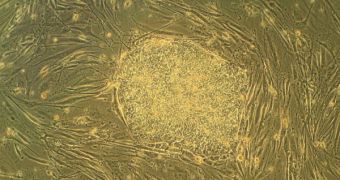Scientists at the University of Illinois reveal that small, mechanical forces applied to embryonic stem-cell cultures may have the ability to drastically influence the structures' differentiation process. This essentially means that applying various types of mechanical stress on the cultures during this stage could lead to different types of end-result cells. Two of the research fields that could directly benefit from this knowledge are regenerative medicine and therapeutic cloning, the team reports.
“Our results suggest that small forces may indeed play critical roles in inducing strong biological responses in embryonic stem cells, and in shaping embryos during their early development,” University of Illinois Professor of Mechanical Science and Engineering Ning Wang explains. The expert is also the corresponding author of a new scientific paper detailing the finds, accepted for publication in an upcoming issue of the respected journal Nature Materials. The paper has already been posted on the journal's website.
According to the scientists, stem cells have a lot of their properties determined by a trait known as cell softness, which dictates the amount of response it shows to modifications in its micro-environment. This property is in charge of determining how much the cell would extend on a surface, how it would attach to that surface, and, oddly enough, what genes would be expressed within it. In their experiments, the scientists were able to measure a cell's softness and also how it responded to the mechanical force.
A small, magnetic bead, about four microns in diameter, was attached to the surface of a living, embryonic stem cell, and was then subjected to an oscillating magnetic field. The team measured the strength of the magnetic field, and then calculated exactly how much the bead moved back and forth. This allowed it to assess the strength with which the magnetic field pulled on the cell, the cell's softness, and also its response to the very small, mechanical force.
“As stem cells differentiate, they become stiffer. The stiffer the stem cell, the less it spreads under stress,” Wang adds. The scientist is also associated with the UI Beckman Institute, Micro and Nanotechnology Laboratory, and with the university's Department of Bioengineering. “The softness of mouse embryonic stem cells makes them very sensitive to localized cyclic forces. If our findings can be extended to early animal embryos, they could provide a new way of locally differentiating a single cell of early lineage, while leaving nearby cells alone,” the scientist concludes.

 14 DAY TRIAL //
14 DAY TRIAL //